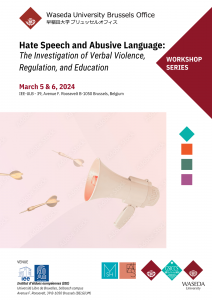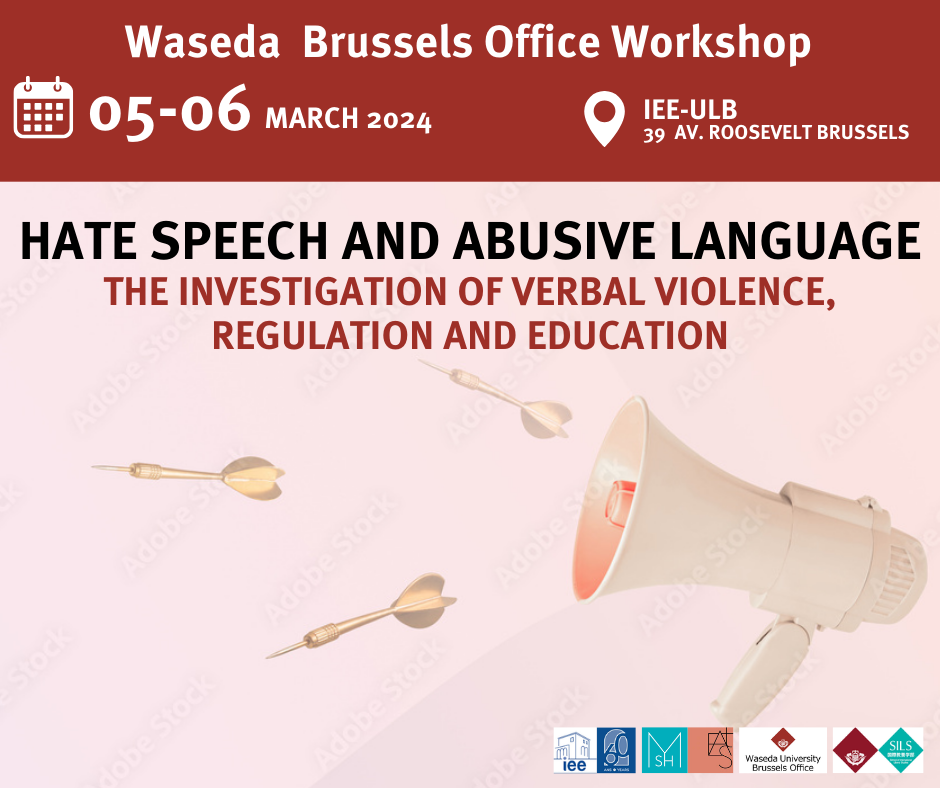Organized at the IEE-ULB by the Waseda Brussels Office, this interdisciplinary workshop will bring together dozens of scholars from both Europe and Japan working on “Hate Speech” and “Abusive Language”.
Format
 Entitled “Hate Speech and Abusive Language: The Investigation of Verbal Violence, Regulation, and Education“, the workshop is co-organized by the School of International Studies (SILS) at Waseda, and the Institut d’études européennes (IEE) of the Université libre de Bruxelles (ULB), with Professor Sylvain Detey (Waseda University – SILS) serving as its’ main academic chair, alongside professor paul Bacon (Waseda – GSAPS) and Norimasa Morita (Waseda – SILS).
Entitled “Hate Speech and Abusive Language: The Investigation of Verbal Violence, Regulation, and Education“, the workshop is co-organized by the School of International Studies (SILS) at Waseda, and the Institut d’études européennes (IEE) of the Université libre de Bruxelles (ULB), with Professor Sylvain Detey (Waseda University – SILS) serving as its’ main academic chair, alongside professor paul Bacon (Waseda – GSAPS) and Norimasa Morita (Waseda – SILS).
Supported financially by Waseda and the Institut d’études européennes, the workshop aims, through a multiplicity of angles, to shed some light on the complexity of contemporary “verbal violence” and, maybe, to offer some suggestions as to how to look for a solution to the problems it creates. It is set to welcome two dozen European and Japanese researchers from 5 disciplinary panels. Each of these panels will unpack current trends surrounding “Hate Speech and Abusive Language” from a specific disciplinary perspective, including: (i) linguistic and education studies, (ii) political science, (iii) sociology, (iv) film studies, (v) media studies and international relations.
Each of the 5 panels will see 2-to-4 scholars present their work followed by a Q&A with the attending audience. Contributors to the panels hail both from Europe and Japan; represent different disciplines, and are at varying stages of their respective research careers.
Agenda
For quite some decades “hate speech” and “abusive language” have mainly been envisaged as abnormal linguistic behaviors targeting specific communities or individuals, and, according to the context, deemed either socially undesirable in the public sphere or straightforwardly illegal. However, with the rapid development of SNS as well as the multifaceted impact of globalization, the complex evolution of what could be termed “verbal violence” has come to affect many spheres of our normal lives, whether is it perceived through a certain form or hypersensitivity or hyposensitivity.
Regardless of its evolving forms, such as cyberharassment, verbal assault, disinformation, or political maneuver, “verbal violence” has come to not only affect all sorts of minorities but all children’s and citizens’ social well-being. The challenges raised by “verbal violence” are not easy to deal with because they are not only linguistic, cultural, and educational; but they also involve an array of social, ethical, political, and ideological factors, as they raise questions of censorship, regulation, and freedom of speech.
This is a scientific workshop aimed mainly at graduate students, early-stage researchers, or academics interested in the ongoing or nascent work scheduled to be presented across the workshop’s 5 panels. Interested parties are welcome to attend but are requested to register
Registration
